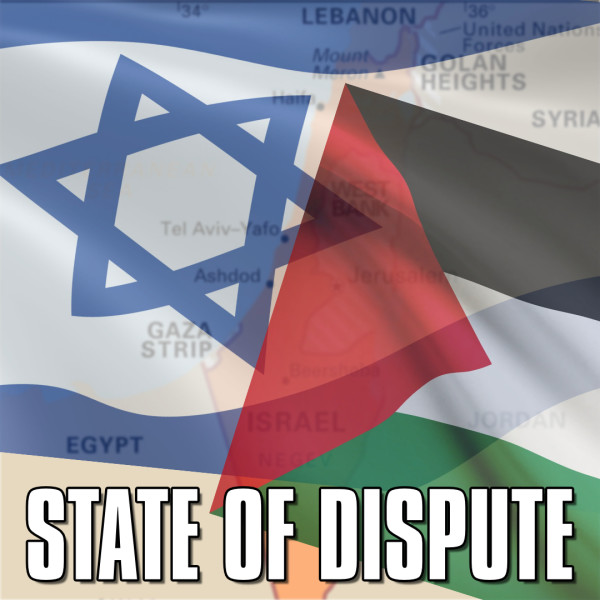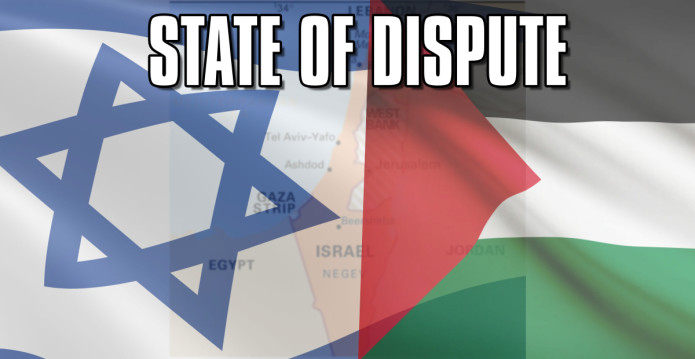
How perceptions of the Middle East are distorted in the West, leading to hatred and bloodshed.
State of Dispute, a new documentary film currently in production, explores and unravels many of the intertwined truths of the explosive Palestinian/Israeli conflict by examining its appeal to young progressives in the US and Europe…and a myriad of issues in which little is clear.
.
State of Dispute Film, Inc. is 501(c)3 non-profit corporation. All contributions are tax deductible.
Introduction
Across Europe and the United States, people have been deeply influenced and divided by the Palestinian-led campaign against Israel, which has become a significant driving force – most notably on college campuses.
Initially dedicated to economically and culturally isolating Israel while advocating for Palestinian rights, the BDS (“Boycott, Divestment and Sanctions”) movement has become a flashpoint in an already complex debate that was further fueled by Hamas’s terrorist attack and taking of Israeli hostages on Oct. 7, 2023. It has stirred up a rising tide of anti-Zionism and anti-Semitism, made even more strident by the active hostilities today between Israel and Gaza, and brought BDS to the forefront of college protests across the world.
In recent polls, one out of every five people have said that politics are hurting their friendships and/or family relationships. The conflict in the Middle East over a small but hotly contested piece of land has been a lengthy and divisive one, with friends and families in the West taking sides…only to see their relationships fractured. Meanwhile, the war still unfolding in Gaza is dominating news headlines every day. And anti-Semitism and Islamophobia are raging.
State of Dispute takes a revealing look at the ongoing conflict, as well as the history and cultures of both peoples, and examines how outside forces have brought us to where we are today.
Background
The Holy Land. Where the Old Testament was not only written, but lived. According to the holy traditions it’s where Moses received the Ten Commandments, where Jesus walked the Stations of the Cross, the point from which Muhammad ascended to the heavens in his Night Journey.
It is also the most hotly contested body of land on the face of the Earth.
In its 6,000 year-long history, the Holy Land has been ruled by Canaanites, Judeans, Egyptians, Assyrians, Babylonians, Persian, Greeks Romans, Crusaders, Ottomans, and the British…among others. By one account Jerusalem has been attacked 55 times, captured and recaptured 44, besieged 23 times, and completely destroyed twice.
It is still being fought over today.
On one side: Israel, a modern state created by Western powers as a home for the Jewish people, based on historical, religious and cultural claims to the land, and the Jews’ victimization in the Holocaust.
On the other side: Palestinian Arabs, who have been living on the land for hundreds of years, and who also have compelling religious and cultural connections to the territory. Thanks to continual outside occupation over the centuries, they have never experienced self-rule.
From the beginning of Zionism and Pan Arabism in the late 19th century, the two groups have clashed over control of the region, each striving to experience political self-determination in modern times. Since the founding of Israel in 1948, there have been at least five full-out wars between the two parties (or ten, depending on how one defines “war”), as well as a never-ending string of attacks, counter-attacks, insurrections and atrocities.
In 2001 the struggle opened on a new front, modeled on the worldwide movement against the Apartheid government in South Africa. BDS was a call by a group of Palestinian intellectuals for governments, corporations and universities around the world to boycott, divest from, and place sanctions against Israel until three major demands were met: An end to the Israeli occupation of Palestinian land, full rights for Palestinians living in Israel, and the right for Palestinians to return to land they or their families held in Israel prior to 1948.
Over the last two decades, this movement slowly gained traction in the U.S. and Europe, particularly among young people and the progressive left.
It has defined a narrative in which Palestinian Arabs are seen as the victims of an oppressive Israeli regime engaged in a form of ethnic cleansing. Israel is portrayed as a “colonial” project created by Zionists representing white European culture and largely funded by the United States.
On university campuses and at political demonstrations, BDS has been adopted as a core progressive cause, just as the anti-Apartheid movement was in the 1980s. As a result, Israeli academics have been banned from academic conferences or prevented from speaking. Major European and American entertainers have refused to perform in Israel.
The movement’s momentum got a huge boost in 2023 when extreme violence broke out again between Hamas and Israel, resulting in horrific deaths, kidnappings, a protracted ground war in Gaza, and catastrophic damage to the region’s infrastructure.
Public opinion in the US is now at a turning point. On college campuses, across social media, and among many who have supported Israel for years, there is growing fury with images of Palestinians suffering at the hands of a far more powerful country. And fury from American Jews over the extreme brutality of Hamas’s Oct 7th, 2023 attack on innocent civilians, and a lopsided point of view that sees them not as a terror group, but as “freedom fighters.”

Adding to the complexity, many supporters of Israel have become frustrated with Israel as well. As Nicholas Kristoff wrote in the New York Times, “the unshakeable bonds of friendship with Israel are shaking.” But much of the changing view is based on a poor understanding of an extremely complex history, and the current realities on the ground.
The anti-Israel BDS movement makes its case on slick websites, and in savvy presentations on campuses and other public forums in the US and Europe. It defines Israel as an “apartheid state” and focuses on the undeniable horrors of day-to-day life in Gaza and the West Bank. It defines itself as anti-racist. It is relatable for a Western audience.
It has been effective.
Critics of BDS assert that the movement’s supporters in the West do not understand BDS, because it presents itself as a moderate organization concerned primarily with civil and human rights for Palestinians, while actually supporting an end to Israel as a Jewish State – an idea that would be unacceptable to many of the movement’s supporters.
This is playing out against a background in which anti-Semitism is growing around the world. Neo-Nazis and other hate groups have been emboldened by right and left wing radical populist politicians. Anti-Semitic attacks worldwide are at a record high and growing. To its critics, BDS is an existential threat to Judaism wrapped in a cloak of Western-style humanitarianism.
State of Dispute takes a deep dive into some complex questions. Is BDS truly a peaceful human rights movement that merely wants equality for Palestinian Arabs? Can Israel be a democratic society, yet still give preferential treatment to people of Jewish decent? Can cultural differences be bridged, or are there deeper political motives on both sides that can’t be resolved?
And what do these questions mean for those in the US and Europe, who consider themselves moral stakeholders in the region and advocates of human rights for all?
Our Film

Demonstrations loudly proclaim: “Israel is an Apartheid State!” “Ethnic cleansing!” “Genocide!” “Life in Gaza and the West Bank is intolerable!” “There’s no freedom or opportunity for Palestinians!” “Israel is a Colonial state!”
Counter-protesters are equally zealous in their opinions: “Israel is the only democracy in the region!” “Life for Arabs in Israel is better than it is anywhere else in the Middle East!” “Israel has a historic right to the land, and Jews need a safe place!” “BDS is a front for Hamas radicals who want to kill more Jews and end Israel as a Jewish state!”
It becomes clear that while some facts are agreed upon, they’re seen through very different lenses. There is no shared narrative. What Israelis see as the return to their ancestral homeland, the establishment of a safe place after the horrors of the Holocaust, and the historical persistence of antisemitism in Christian societies, Palestinians see as the Nakba, the Catastrophe. Palestinian history sees that the land they had been living on for a thousand years, and the homes they had occupied for generations, were taken from them. And lurking behind this division is a deep cultural and religious history pitting Islam versus non-believers.
The narrative is reinforced by both archival footage and original footage of present-day life in both Israel and the Palestinian Territories. With the help of our Celebrity Narrators and interviewees, we cover the years between 1948 and the present, including the birth of Fatah in 1954, the PLO in 1964, and the formation of BDS in 2001, told by experts representing both pro and anti-BDS positions.
State of Dispute presents both sides of the argument, and different perspectives of the same events. While BDS sees Israel as an “apartheid state,” Israel maintains its right to protect itself, even if that means suppression of those who would attack it.
Our film will move through a series of focused chapters that explore the greater issues of the Palestine-Israel debate. Each segment will be constructed with a mixture of expert interviews, person-on-the-street/stakeholder interviews, and objective Narration, along with original and archival footage. Viewers will not only hear many sides of these complex issues, but experience them through the people who live them.
Questions addressed in State of Dispute include:
• Who has a “right” to live in Israel/Palestine?
• Is Israel really an “apartheid state”?
• What is the definition of “genocide”?
• What is the Right of Return, for both Jews and Palestinians?
• If anti-Israel activists were to accomplish their goals, what would the political and social landscape look like? What would happen to Jews?
• The money trail. Who is actually profiting from either side of this conflict – and does this work against stated goals of detente and conciliation?
Through these questions and others, State of Dispute examines a number of key issues. How is life lived on both sides of the divide? Are there economic and political benefits to prolonging the dispute? Is Israel a Middle Eastern Country or a Western Country? Why are solutions so hard to find? What are some feasible potential solutions?
Throughout, the film moves in a collage-like fashion between locations, environments, stakeholders and viewpoints to create a visually compelling and intellectually challenging whole. The film seeks to create understanding without inflaming passions.
Progress So Far
We resumed production in 2022 after a pandemic-induced hiatus. Thus far we have filmed over 50 interviews with a broad spectrum of concerned activists, journalists, authors, political figures and other public and private figures, resulting in more than 40 hours of footage. A partial list can be seen on our IMDb page: https://www.imdb.com/title/tt8496264/?ref_=fn_a…
We’ve also made progress in identifying archival material. We are planning for broad distribution, and are in discussions with distributors who have already expressed interest in the film.
State of Dispute is a 501[c]3 non-profit project.
We’ve raised over $90,000 in donations, and seek approx $100k more to purchase key news and stock footage, complete production, support post production, and for festival entries, distribution and social media outreach.
The Plan
To complete principal photography in 2024. We’ve already begun editing, and should be completed by the end of the year. This will include reviews by advisors, music composition, and high-quality color correction and sound mix.
This schedule will allow us to submit to major documentary film festivals such as Sundance and Full Frame that have deadlines in the fall.
Our IMDb page: https://pro.imdb.com/title/tt8496264/?ref_=nm_f…
Email address: stateofdispute@gmail.com

